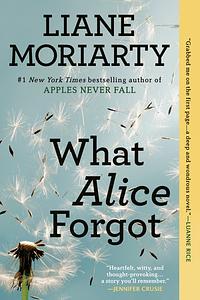Take a photo of a barcode or cover
emotional
funny
hopeful
reflective
sad
medium-paced
Plot or Character Driven:
Plot
Strong character development:
Yes
Loveable characters:
Yes
Diverse cast of characters:
Yes
Flaws of characters a main focus:
Yes
emotional
mysterious
medium-paced
Plot or Character Driven:
Character
Strong character development:
Yes
Loveable characters:
Complicated
Diverse cast of characters:
No
Flaws of characters a main focus:
Yes
Never read a book that made me cry the entire time. So beautiful and heartbreaking.
emotional
funny
lighthearted
mysterious
medium-paced
Plot or Character Driven:
Character
Strong character development:
Yes
Loveable characters:
Yes
Diverse cast of characters:
No
Flaws of characters a main focus:
Yes
I just know I'm always going to enjoy a Liane Moriarty. Although not as sharp as Big Little Lies or Nine Perfect Strangers, it was still binge-worthy and an astute observation of how people change over time and what makes who we are. However, it lost marks for the weird obsession with all the female characters weight and how it fluctuated over the years, which seemed to depend on how happy they were, and whether or not they allowed themselves a Twix. It also predictably fell into easy gender roles as I find a lot of her books do. It's forgiveable only because it's pretty realistic for 2008 but I hope her newest book can push back on this rhetoric a bit more.
Graphic: Infertility, Pregnancy
Moderate: Fatphobia
emotional
hopeful
reflective
sad
medium-paced
Plot or Character Driven:
Character
Strong character development:
Yes
Loveable characters:
Yes
Diverse cast of characters:
No
Flaws of characters a main focus:
Yes
Loved this book. Very current and it's an interesting premise...
4.5 stars that I'm rounding up. My one quibble with the story is that I generally don't like Epilogues that have major plot points in them. It's one thing to vault into the future to give some updates to characters (as in the Harry Potter series), but this book ends and the Epilogue essentially changes the ending (no spoilers here really). I would have liked to have seen how the characters reached that point in the Epilogue--especially with such a big change happening between the end and the Epilogue. Yes the book is 459 pages, but there's a lot of white space on the page and I think that some time should have been given to the evolution of the relationships instead of just tacked on at the end.
What I loved about the book is that the portrayal of a marriage/this marriage seemed real. It's easy to think in absolutes--she *always* does this; he *never* is around--especially when things aren't going very well. For Alice, losing 10 years of her memory in a freak accident was to step back in time to when their marriage was easier (pre-kids, pre-hurt, anger, grief, etc.) and to erase all of that and the "absolute" type of thinking that often happens when you're divorcing (not that I speak from experience myself, but in witnessing those I love divorcing). I enjoyed reading about how she reconciled her thoughts about her marriage when her memory was erased with how she felt once all of her memories came flooding back. I wish there was more of *that* aspect of the book, too.
I think the trick for all of us, in any relationship, is to bring back some of who we were in those simpler times, and try to find a balance between who we were back then with who we were now. Maybe there would be more understanding and giving the benefit of the doubt and not thinking in absolutes. Perhaps all of our relationships would be better for it.
What I loved about the book is that the portrayal of a marriage/this marriage seemed real. It's easy to think in absolutes--she *always* does this; he *never* is around--especially when things aren't going very well. For Alice, losing 10 years of her memory in a freak accident was to step back in time to when their marriage was easier (pre-kids, pre-hurt, anger, grief, etc.) and to erase all of that and the "absolute" type of thinking that often happens when you're divorcing (not that I speak from experience myself, but in witnessing those I love divorcing). I enjoyed reading about how she reconciled her thoughts about her marriage when her memory was erased with how she felt once all of her memories came flooding back. I wish there was more of *that* aspect of the book, too.
I think the trick for all of us, in any relationship, is to bring back some of who we were in those simpler times, and try to find a balance between who we were back then with who we were now. Maybe there would be more understanding and giving the benefit of the doubt and not thinking in absolutes. Perhaps all of our relationships would be better for it.




